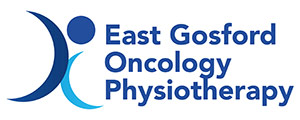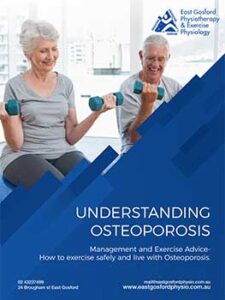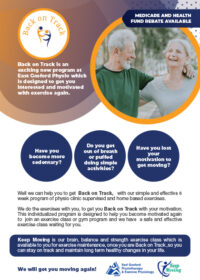
24 Brougham Street, East Gosford
Call (02) 4323 7499
NEW LOCATION

3 Hills Street, Gosford
(upstairs of Dr Sharon Laura rooms)
Call (02) 4323 7499
Blood Cancer Rehabilitation Program at East Gosford Oncology Physiotherapy
East Gosford Oncology Physiotherapy and Exercise Physiology can help you in your rehabilitation and advise you on how exercise and physio can help manage you blood cancer treatment side effects.
Exercise plays a significant role in the rehabilitation of individuals with blood cancer (myeloma, leukemia, Lymphoma).
Chemotherapy, radiation therapy, and stem cell transplantation lead to weakness, fatigue and pain. Exercise can help manage these effects and improve overall well-being before, during and after treatment.
East Gosford Oncology Physiotherapy and Exercise Physiology have developed a program to help people recover from the side effects of blood cancer treatments.
How physiotherapy and exercise can help blood cancer patients with their recovery.
1. We can help you manage some of the general side effects of your blood cancer journey and treatment, which can lead to:
Cancer-related fatigue
Common side effect that can persist even after treatment. Exercise has been shown to reduce fatigue and improve energy levels in individuals undergoing cancer treatment.
Muscle weakness and loss of muscle mass
Common with blood cancer and treatment for the cancer. Resistance or strength training exercise (using weights) help build muscle strength and can preserve muscle size, which can improve function.
Loss of Cardiovascular fitness is common in your blood cancer journey and treatment.
Aerobic exercises, such as walking, cycling, or swimming, can help improve cardiovascular fitness, endurance, and overall heart health, but initially need to be performed gently and gradually built up.
2. Improve and manage the musculoskeletal and mobility side effects of blood cancer treatment with oncology physiotherapy
Muscle pain and stiffness.
Blood Cancer treatment leads to prolonged periods of inactivity, and this can cause joint and muscle pain and stiffness. Gentle stretching and range-of-motion exercises can help maintain or improve joint mobility and muscle length. This helps in prevention of injury when you start to become active again. Our Oncology musculoskeletal physios will advise you on the best program to minimise this and prevent injury.
Balance, Coordination and Falls prevention.
Some cancer treatments may impact your balance and coordination. Our physios will advise on specific exercises and balance re-training to improve your balance, reducing the risk of falls and enhancing overall mobility.
Bone density and Fractures.
Blood cancers can weaken bones, and this increases the risk of fractures, especially if your balance is affected and you are a falls risk. Our physios will advise on a specific weight-bearing and resistance exercise program that will help strengthen bones and improve bone density. If you have been diagnosed with Osteoporosis, lytic lesions, or compression fractures, it is even more important that this is addressed as part of your rehabilitation program and consider a falls prevention program.
For more information about Osteoporosis see our eBook
3. Oncology physiotherapy and exercise advice can help with the psychological and emotional side effects of blood cancer treatment
The right mix of exercise has been shown to alleviate symptoms of anxiety and depression by providing a boost to mental well-being during the challenging journey of Blood cancer treatment. Exercise helps to release chemicals in your brain to improve your mood and make you feel happier.
Regular physical activity and exercise will improve your quality of life by promoting a sense of control, improving self-esteem, and reducing cancer-related distress. Initially it is difficult to see this, and it is common to experience low mood during the cancer treatment phase, but once treatment is completed, we can help you move into the Strong survivor phase of your journey and provide exercise advice to help you enjoy life again. Everyone manages this differently so you will need a program that is specifically tailored to you. Let us” hold your hand” during this phase with our BACK ON TRACK program of supervision and advice on getting back into exercise.(see link to flyer)
To help promote long term exercise habits and build a social support network we offer a group exercise program called Keep Moving Strong Survivor. (link to video) Ask your physio if you are ready for this program.
4. Exercise can help with your Immune System – this is essential to stay healthy during your cancer journey.
We now understand that moderate-intensity exercise has been found to have positive effects on the immune system. It may help enhance immune function and reduce the risk of infections during and after treatment. Your Oncology physio will help you understand intensity of exercise and guide you through an individualised program to ensure it is both safe and effective.
East Gosford Oncology Physiotherapy is always here to provide you with supportive care and advice on all aspects of exercise and rehabilitation – both physical and emotional.
Our Keep moving Class and our Back on Track program provide structured exercise programs tailored to the unique needs of individuals with blood cancer providing a sense of community and support, helping you with long term adherence and motivation.
All our Blood Cancer exercise programs at East Gosford Oncology Physiotherapy are tailored to your specific needs, phase of your treatment or cancer Journey, overall health status, and physical barriers such as arthritis, muscle and bone pain, compression fractures, Boney lesions and nausea resulting from treatment side effects.
We develop an individualized, safe exercise plan to address your individual goals at all stages of your blood cancer journey.
Always consult with your healthcare team before initiating an exercise program, particularly during active treatment, to ensure it aligns with your specific medical condition and treatment plan.




